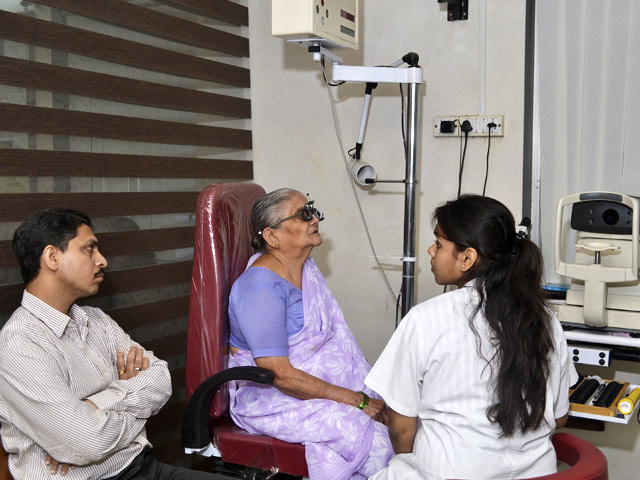Age Related Macular Degenration (Retina)

About Age Related Macular Degenration (Retina)
Age Related Macular Degeneration [AMD] causes irreversible visual damage in the elderly. Early determination of conversion of DRY AMD to WET AMD is essential for treatment with Intravitreal Anti VEGF Injections.
AT GULMOHUR EYE CLINIC we screen all our patients for AMD and follow up DRY AMD patients with serial scans of the MACULA, so that we can attempt to certain the visual loss at the earliest.
Our 3D OCT -1 MAESTRO from TOPCON [Japan] provides high resolution retinal scans even in small pupils to aid our treatment of AMD.
Age Related Macular Degenration FAQs
Age Related Macular Degeneration (AMD) is a disease associated with aging, characterized by damage to the central part of the retina called macula.
It is the most common form found in 90% of patients. Dry AMD occurs when the macular tissues get thin and slowly lose function. The most common symptom of dry AMD is blurred vision which causes difficulty in recognizing faces, increases light requirement for reading and other tasks. Visual deterioration is slow but usually not profound. About 10-20% of people with dry AMD advance to the wet form.
It is the less common but more aggressive form of AMD. If it is not treated it may get worse rapidly. Wet AMD is caused by proliferation of abnormal blood vessels under the retina which may exude or leak out fluid, or bleed and ultimately lead to the formation of a scar under the retina.
- Diminution of vision in an important symptom of macular degeneration. This lack of ability to see objects clearly affects ones ability to read, drive and see details.
- Straight lines appear crooked or wavy.
- A dark area appears in the centre of vision e.g. words in the central part of the page look smudged.
Having one or more of these symptoms may not necessarily mean that one has AMD and it warrants an immediate eye check up (early detection is important).
Age - is the greatest risk factor. Although AMD can occur during middle age, studies show that people over 60 years of age are at great risk. The risk increases with increasing age.
Family History of AMD increases the risk.
Race - White populations are more predisposed to suffer vision loss from neovascular AMD than Asian or African populations.
Smoking has a definite correlation.
History of hypertension, heart disease, or lung infection adds to risk.
Early detection is important as smaller lesions have a better recovery and chance of maintaining reading vision than advanced cases with larger lesions and fibrotic changes. Your ophthalmologist may suspect AMD if you are over 60 years of age and have recent changes in central vision. To establish a diagnosis a comprehensive eye check up is done.
Visual Acuity test - This eye chart test measures how well you see at varying distances.
Amsler Grid - In this test the patient wearing his reading glasses, covers the opposite eye and looks at the black dot in the centre of the test page (checker board pattern) to check for any area which is distorted, blurred, discolored or not visible. It is a useful test to detect early changes and can be done routinely by the patient at home.

Dilated eye examination - To look for signs of the disease your doctor will use drops to dilate or widen the pupil. With a special magnifying lens and a light source your doctor will examine your retina. Dilating drops hamper close vision for around 4-5 hours.
Regular Amsler grid monitoring to detect conversion of dry form to wet form is important.
Precautions and Life style changes
- Yearly complete eye check up.
- Regular Amsler monitoring once patient is diagnosed to have AMD.
- Anti-oxidants to decrease progression of AMD.
- Healthy diet rich in green leafy vegetables and fish.
- Avoid smoking.
- Maintain normal BP.
- Exercise and avoid obesity.


